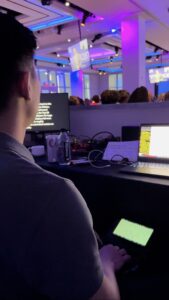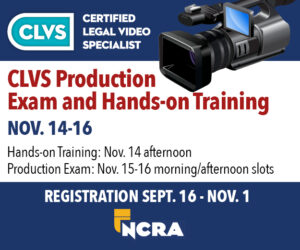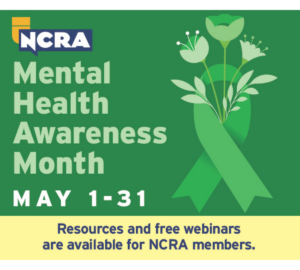By Cindy Hinds
This year, the Texas Court Reporters Association (TCRA) worked in conjunction with NCRA to bring the NCRA Certified Realtime Captioner Workshop to the Texas convention. In addition, the TCRA CART/Captioning Committee was able to bring the program to its members for only the cost of the convention. This article explains our joint venture and how we paid for it without passing all the costs to the CRC attendees.
The CART/Captioning Committee determined that we had taught our last “CART 101” class at a state convention. The basic “This is CART” course wasn’t really helping anyone. It didn’t tell court reporters how to get started in CART; it wasn’t helping our professional CART captioners become more knowledgeable in their field; and the few TCRA CART captioners on the Texas roster had grown weary of talking to themselves. (I say that with great affection, as I am one of those few Texas captioners.) The committee wanted to supply more value for the captioners’ convention dollar as well as reach out to the court reporters who were interested in CART. We wanted all members, and especially CART captioning members, to walk away with some benefit for the money paid and time spent at the convention. We also hoped that bringing something new to Texas might serve to bring more CART captioning members into TCRA, thus increasing our membership. We are never going to get past CART 101 if we do not grow our CART captioning membership.
After much discussion about different “canned” programs that we might invite, the committee determined that bringing the whole CRC program to Texas from NCRA would be a great value for our members. Just think: For the cost of the convention itself, a member could earn CEUs, complete one leg of the CRC certification, and gain all the intangible benefits of attending a convention. But how would we pay for a program such as the CRC and the expense that comes with it without overburdening the attendees? We found the answer in our history.
TCRA, as it turns out, has a long history of being proactive where CART is concerned. Almost 20 years ago, a small group who recognized the potential for CART formed the CART Foundation in order to pursue grants to train CART writers and to help pay for CART projects. The CART projects would serve as proof of the effectiveness of CART in the classroom. Over the six or so years that the foundation existed, they hired grant writers and petitioned the proper state agency — in Texas, that agency is the Department of Assistive and Rehabilitative Services (or DARS) — for grants in order to train CART providers and to fund CART projects. The foundation was also awarded some monetary gifts from interested private citizens.
Then the CART Foundation decided to dissolve because there simply were not enough people to carry the torch. The organization granted the money it raised back to DARS with the requirement that the money be used to train CART writers. There the money sat until TCRA came and asked for it again more than ten years later for the very same reason. DARS was happy to grant the money to TCRA to bring NCRA’s CRC program for the purposes of training CART captioners who would then offer a valuable service to the community that they serve. Our request was made by a simple letter from the Executive Director of TCRA and a contact person who simply called attention to our request.
While the CART Foundation found it necessary to hire a grant writer in the 1990s in order to get the grant from the government agency, we were able to obtain the funds this time with a simple letter. Would that have been possible if we hadn’t already exchanged this money in the past? Most likely not.
Before we secured the funds, we did a lot of back-and-forth discussion between NCRA and TCRA to negotiate the terms. This was new territory for both associations, so it did take a bit longer than we would have liked. We agreed to pay NCRA’s licensing fees for the program, which is a great program. The agreement also covered traveling expenses for the two instructors who would be representing the national association in Texas. After a bit of math, we ascertained that if we were able to get 28 people to the convention and pay for the program, it would bring us to the break-even point financially, meaning TCRA would incur no loss to offer the program for only the cost of the convention.
TCRA was responsible for the advertisement, and we accomplished this solely through electronic means and word of mouth. Our top priority was to supply the seminar to our members for no more than the cost of the convention. We also wanted to give people a choice of attending only the CRC program without the rest of the convention, so we offered the course as a standalone choice at an even cheaper cost than we charged for the full convention. We charged nonmembers more than members, yet still at a small discount to the price of NCRA’s online CRC seminar offering. NCRA earned a little money, and TCRA gained a few more interested members. The CRC workshop was very well rated in the survey given after the Texas convention, and both associations consider the venture a big success with only a few wrinkles to iron out.
Some things we will work on, should we decide to do this again in Texas, is paying attention to some details. In Texas, Certified Shorthand Reporters (CSRs) are to get a set number of ethics credits every two years to meet the CEU requirements for the CSR. When we presented the CRC program to our state governing body for CEU approval, we failed to get recognition for the ethics component in the CRC program itself. As a result, many attendees had to choose between staying at the CRC and completing that program or leaving and attending one of the ethics programs in the general convention, which were not offered at convenient times to allow the CRC attendees to attend. We also discovered the same problem in certification testing. It will be possible to avoid these conflicts in the future, but it will take careful planning.
While this joint venture with NCRA was revolutionary, we realize the funding story is a bit uninspiring since all we really did was trade money with the same state agency a few times. Since a group of Texas reporters managed to accomplish this in the 1990s, there is no real achievement there. However, I would point to the efforts of the CART Foundation members who did secure those funds from DARS in the first place. Their efforts to win those grants and train CART captioners when CART was in its infancy is quite inspiring. The real inspiration here is that, if it was possible in the 1990s when CART was something we had to sell as effective communication access, it should definitely be possible now with years of proof that CART is a valuable tool in helping the deaf community gain access to realtime communication in almost any setting.
So, CART captioners who are involved with your state agencies, get busy! Bringing NCRA’s CRC Workshop to your state convention could serve to benefit many different people. The CART writers get trained; the state organization stirs interest and builds membership; the members get something of real value to take with them from the convention; and the deaf consumer benefits from a more educated CART captioner. Also, I urge you to pursue grants from the agency that serves the deaf and hard of hearing in your state. You might find that you can gain all these benefits at no extra cost to your members.
Cindy Hinds of Mabank, Texas, is a broadcast captioner and a participating member of NCRA. She can be contacted at cmhinds2003@gmail.com. She extends her thanks to the TCRA CART/Captioning Committee, including Terry McGinty, RDR, CRR, CRC; Whitney Riley, RPR, CRR, CRC, CRI; Tess Stephenson; Kathleen Ullrich; and Kristi Usery.

















